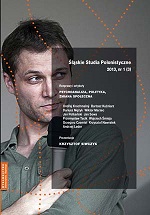Mesjańska (bez)nadzieja nowoczesności: Hegel, marksizm, psychoanaliza
Messianic Hope(lessness) of Modernity: Hegel, Marxism, psychoanalysis
Author(s): Przemysław TacikSubject(s): Literary Texts
Published by: Wydawnictwo Uniwersytetu Śląskiego
Summary/Abstract: The article aims at exposing complex relations between Marxism and psychoanalysis as two purely modern discourses. In order to account for their specific position, suspended between philosophy and science, I attempt to outline the structure that conditions both of these “quasi-sciences”. This structure does not influence their content directly, but organises the very rhythm of Marxist or psychoanalytical thinking. However, while all scientifical discourses are conditioned by similar structures, only Marxism and psychoanalysis attempt to refer to it directly. In other words, the key difference that distinguishes them from other sciences consists in their self-referential loop. Consequently, Marxism and psychoanalysis do not possess an object neatly separated from themselves, but constantly return to the reality in which they are already included. Contrary to idealism, they do not take this self-reference for a starting point, but for a contradiction that needs to be sublated. As a result, both Marxism and psychoanalysis aim at sublating themselves along with the present reality they reject. In this regard they are the only discourses that are able to reconstruct the conditions of possibility of sciences, even though they pay the price of having at least dubious reputation in the scientifical world. In my exposition I refer to Luter’s doctrine, Hegelianism and Lacanian psychoanalysis in order to explore the status of Marxism and psychoanalysis as specifically modern discourses, being not only profoundly conditioned by mechanisms of modernity, but also having the capability to reconstruct them.
Journal: Śląskie Studia Polonistyczne
- Issue Year: 2013
- Issue No: 1 (3)
- Page Range: 91-113
- Page Count: 23
- Language: Polish

